Heather Johnston joins ‘Limited Liability Podcast’
The U.S. Israel Education Association founder and executive director got candid about the importance of bringing members of Congress through the region

Courtesy
Heather Johnston
Despite the strong relationship between the United States and Israel, not many members of Congress have actually visited the Jewish state. Heather Johnston, this week’s guest on Jewish Insider’s “Limited Liability Podcast,” is working to change that. Johnston, the founder and executive director of the U.S. Israel Education Association (UIEA), an organization that educates members of Congress and helps them foster stronger ties between the two countries, has been bringing senior government officials on tours to Israel since 2011. Additionally, Johnston is the founder and director of JH Israel, a leadership nonprofit; in her work for that group, she teamed up with former Ariel Mayor Ron Nachman to establish the National Leadership Center in Ariel, which brings together students from across Israel to take part in a series of obstacle courses, and connect the lessons they’ve learned to their everyday lives. Johnston sat down with co-hosts Rich Goldberg and Jarrod Bernstein to discuss her organizations and what it’s like bringing lawmakers to Israel.
The U.S. Israel Education Association in a nutshell: “Well, I founded this organization with the intent of being able to educate senior members of Congress and to serve them toward a strong U.S.-Israel collaboration, and to help them to discover their lanes of action and ways they can lead inside that collaboration.
“It’s a bipartisan organization, so we’re not lobbying, we’re not trying to move issues to the right or to the left, it’s really staying in the middle and bringing both Democrats and Republicans into the collaboration on things they can work on together. That’s part of our base. And then secondly, it’s a wide Jewish and Christian audience that care about this. So we have a broad base of Jews and Christians in the United States, primarily, but also in other parts of the world, and certainly in Israel.”
On what sets the UIEA apart from similar organizations: “We established the first-ever trips [for members of Congress] through the West Bank. So if you can imagine, the U.S. State Department did not allow U.S. officials to cross the Green Line into a Jewish community inside the West Bank, or Judea and Samaria, and so we started those tours. And why is that important? Well, it has brought to light an entirely different narrative than what’s been reported in the news, and even on Capitol Hill. When you can take a congressman or a senator to see it for themselves, to actually see industrial zones and businesses where Palestinians and Israelis are working together, you can interview for yourself… and interview the business leaders down there and find that 90% want to or are working with Israelis. Well, these are really important things to do inside of a tour like that.
“Well, this is a paradigm shift for a congressman, a U.S. official who’s never been introduced to anything like that. It has had an impact, so much so that legislation and the policy changed between Democrats and Republicans on the Hill in the way of supporting and coalescing around. And legislation was passed with bipartisan support to change the way U.S. investment is put into the West Bank. So part of that investment now is going to Jewish communities, not just Palestinian, to further joint business between Palestinians and Israelis.”
On the importance of leading trips through tours of the West Bank: “I think that everybody’s a little bit out of their comfort zone to go into the West Bank, because it’s new, it’s novel that our U.S. leadership would go through there, but how critically important it is. And so the response across the board…if you’re a congressman today, whether you’re a Democrat to the far left or you’re Republican to the far right, when you see Palestinians and Israelis in the workforce together, when you see and hear testimonies from Palestinians that they want to and are actually in joint business with Israelis, and that their income is three times what it was, that is music to the ears of any human being that cares about people. When it comes down to it, Palestinians want success and prosperity. They want to be able to trust their institutions, they want to have business, they want to pass on inheritance to their children, just like anybody else does. They are regular folk. And for the most part, the papers reveal the activists and radical elements all the time, but that’s not the average Palestinian. So whether you’re a Democrat or Republican, to come on my tour, you’re going to get to see the regular folk, interview them, and understand where the movements are taking place, and where you’ve got large tens of thousands, hundreds of thousands, of Palestinians today, now, inside the workplace with Israelis.”
On “nearshoring” America’s pharmaceutical supply chain from China to the Middle East: “I think all of us went through COVID-19, right. It was such a difficult season, and it was so befuddling and chaotic and churning, and one of those areas that was so destabilizing, we’re still feeling the effects of it today, are the change in our supply lines, the cut to our supply lines, the inability to get certain products. And the biggest and most dangerous of those was the pharmaceutical and life sciences supply chain. There were critical, and still are today, critical components to our medications, from aspirin to contrast solution for an MRI that if you went out today to try to go get an MRI, you may or may not have contrast solution for your MRI today. Those are things that have challenged the average lawmaker and are challenging the average American today as well. So it was a natural-born thought to consider how might we now, with a new Middle East Abraham Accord, nations now joining a nexus with the United States and Israel, a staging ground if you will…is there a way to take some of our critical supply chains, pharmaceutical industry, and move out of China? Can Congress incentivize that toward our friendly nations? Toward Morocco, Bahrain, toward the UAE, who has an incredible amount of medical research clinical trial ability — Morocco being a staging ground in the Middle East for manufacturing — there’s a lot of potential for that. And so we have brought that education to the Hill for Congress and are doing the background writing and research on all of these nations to be able to further explain why this is so important that we consider this for the future.”
The creation of The National Leadership Center in Ariel: “About 23 years ago, my husband and I got involved with the nation of Israel. It was during the time of the Russian aliyah — Russian Jews were pouring into Israel in the 1990s, and we arrived at that time… As you can imagine, Ben Gurion Airport was just packed with Russian Jews who were carrying only their suitcases. And so we came in at that critical time, and we met Mayor Ron Nachman, who had founded the city of Ariel, which is inside the area of Samaria, or the West Bank…And he was the principal leader; he dropped two tents out of a helicopter and established that city. It is the ancient home of Joshua — Joshua was buried right down the street with Caleb. Joshua had to have that city in his day, and Israel has to have that city in modern times, not a single thing has changed.
“It is the high point, it is the waistline, it’s the strategic security front in giving up the Sinai Peninsula. Ariel Sharon sent Mayor Ron Nachman to establish that city. So, it’s become sort of the regional hub. It is where we shook hands together and agreed to build a national leadership site on those hills in Samaria. And today we’ve had more than 85,000 young Israelis come across the Green Line out of Tel Aviv. They’ve [probably] never been into Samaria to see their biblical heritage sites, and understand what’s taking place there. The content surrounds the biblical heritage on the life of Joshua, Caleb, Esther, David, Moses. They’re climbing on big events — ropes courses — and challenging events, like there’s not another site like it in Israel today. So the IDF is training there, the Mossad, special forces, all of the major youth movements in Israel are doing their leadership training at our site that we helped establish. It’s Jewish-run, there’s about 35 Jewish leaders in education that are there running that site.”
Bonus Question: Johnston’s favorite place to eat in Israel? “I love the Mamilla rooftop. To go on top of the Mamilla hotel is to look out and see the walls of Jerusalem at sunset, and to enjoy their great wine, to enjoy their great Israeli Mediterranean food — probably one of my best spots.”










